Unit 2 Sporting events Grammar and usage Modal verbs课件(59张)
文档属性
| 名称 | Unit 2 Sporting events Grammar and usage Modal verbs课件(59张) |

|
|
| 格式 | zip | ||
| 文件大小 | 310.6KB | ||
| 资源类型 | 教案 | ||
| 版本资源 | 牛津译林版 | ||
| 科目 | 英语 | ||
| 更新时间 | 2019-07-25 00:00:00 | ||
图片预览

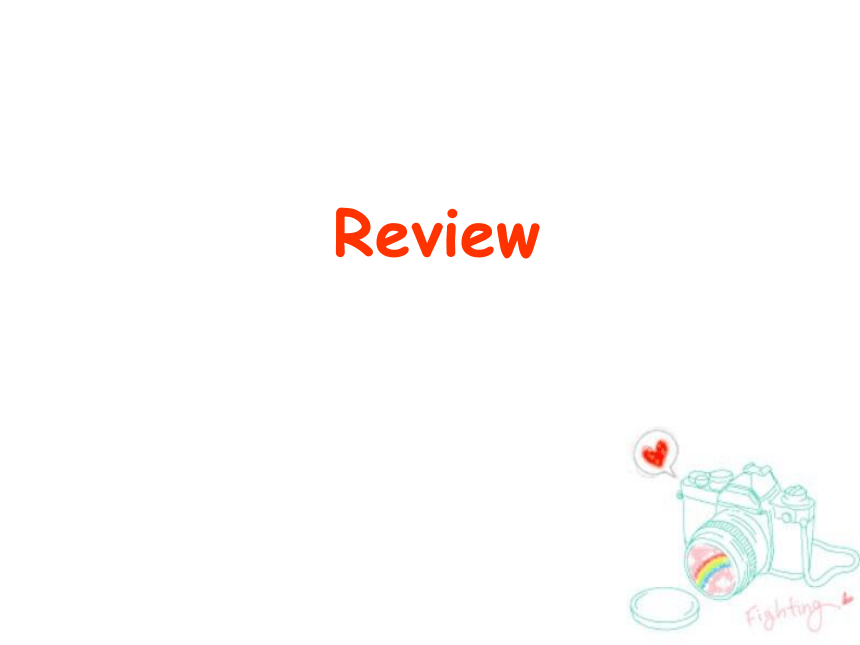


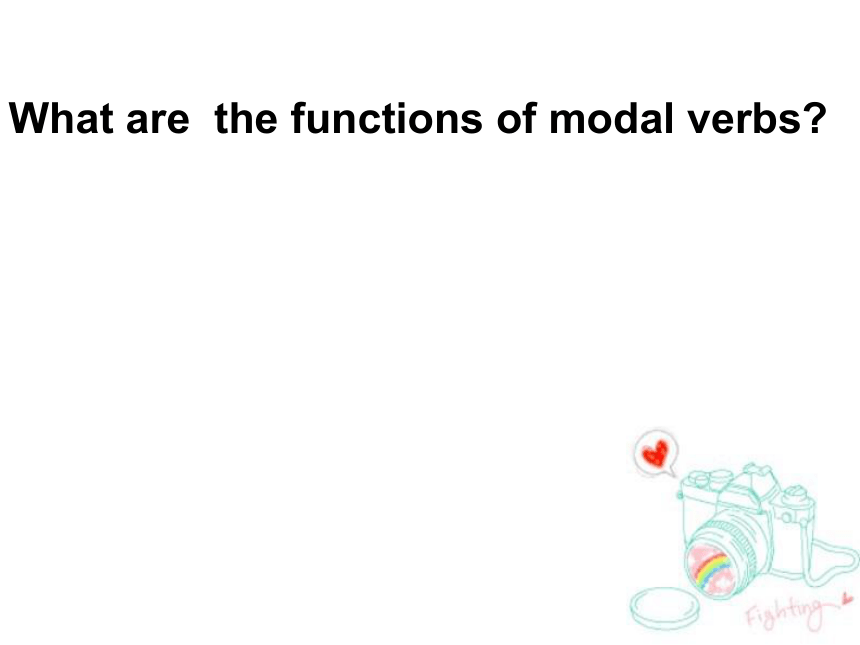
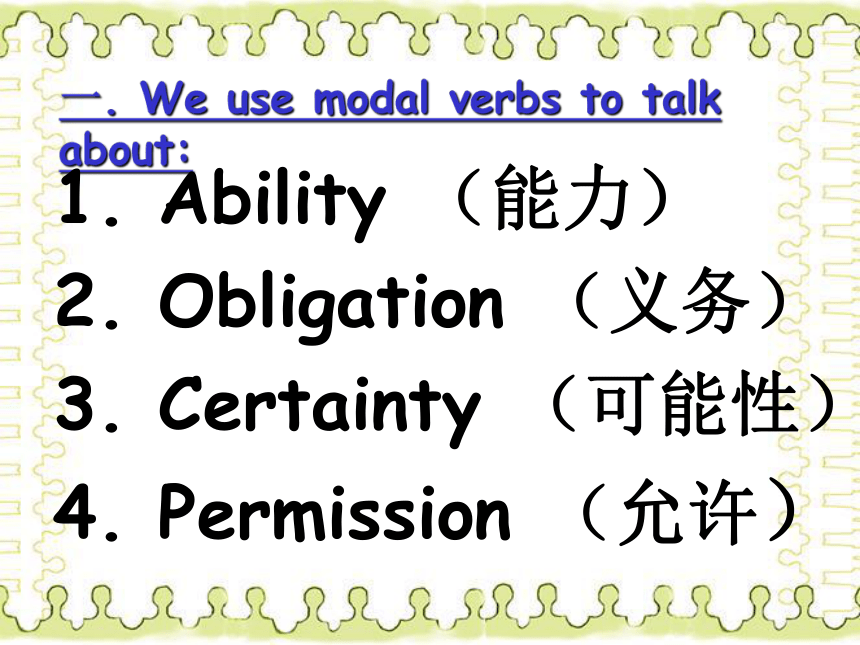

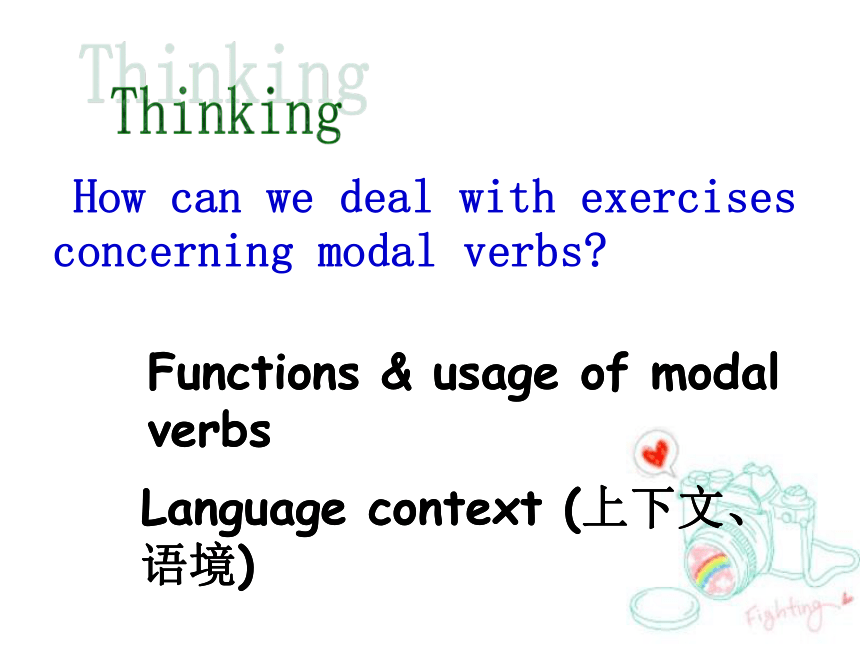
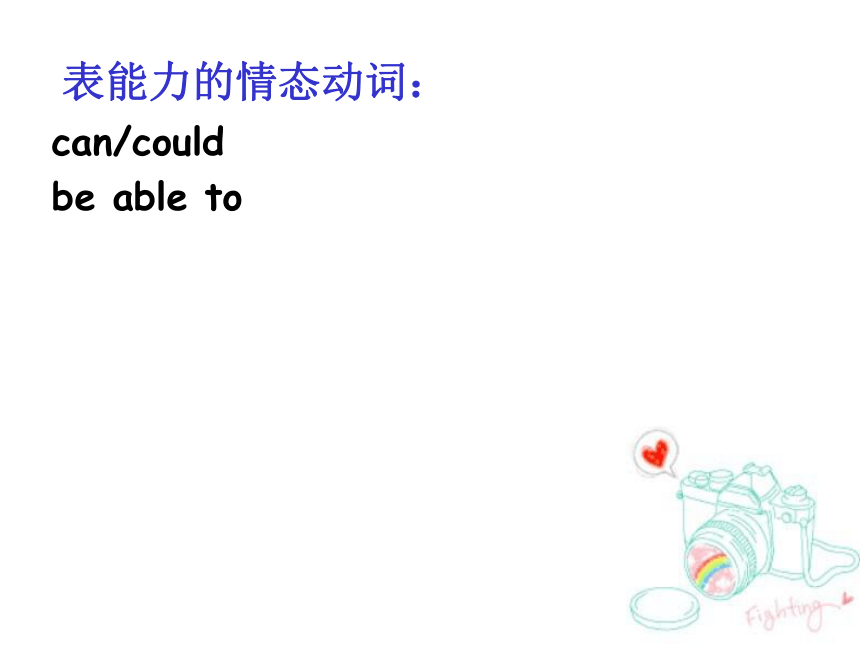



文档简介
课件59张PPT。Unit2 Grammar and UsageModal verbsReviewstudying aims1.Review modal verbs.
2.Learn to use modal verbs with exercises.
What’s the definition of modal verbs?情态动词是一种本身有一定的词义,表示说话人的情绪,态度或语气的动词,但不能单独作谓语, 只能和其他动词原形构成谓语。 What are the functions of modal verbs?一. We use modal verbs to talk about:1. Ability (能力)
2. Obligation (义务)
3. Certainty (可能性)
4. Permission (允许)二.We also use modal verbs to:5. Make requests(提出请求)
6. Make suggestions(提出建议)
7. Make offers(提供帮助)
8. Give advice(提出意见) How can we deal with exercises concerning modal verbs?Functions & usage of modal verbsLanguage context (上下文、语境)ThinkingFunctions & usage of modal verbsLanguage context (上下文、语境) 表能力的情态动词:
can/could
be able to
情态动词表示能力
情态动词表示能力时,一般用can/could或be able to。
1.can常指现在,较常用;如果只表示能力时,两者都可用。
e.g. I can / am able to swim.
2.be able to ① 可用于各种时态
e.g. We shall be able to finish the work next week.
② 侧重于“克服一定困难”“经过一定努力”“有能力”干某事
can ① 只有一般现在时和一般过去时两种 时态
② 客观上能够即讲即练
The fire spread through the hotel very quickly but everyone ____ get out.
A. had to B. would
C. could D. was able to
答案:D情态动词表示推测的用法
(语气从强到弱)
1._____所表示的可能性最大,最有把握,意为“一定”。
2.can和could主要用于____句和___句中,can’t或couldn’t 表示“不可能”。
3.may和might表示现在或将来可能发生的动作或情况,主要用于____句中,might相对于may来说,表示的可能性更小一些。must→should→can→could→may→mightmust否定疑问肯定注意:
1 表示猜测,can/could一般不用于肯定句中,除非是“经验之谈”。
e.g. Anybody can make mistakes.
2 表示猜测,may和might都不用于疑问句中。
e.g. (正) Can /Could it be cloudy tomorrow?
(误) May /Might it be cloudy tomorrow?4. should也可以用来表示“推测”,意为“可能;该”,相当于be expected to。往往指具有一定的客观根据或根据推理对现在某事发生的“可能性”进行描述,语气上不如must强。
It’s nearly seven o’clock. Jack _____ be here at any moment.
A. must B. need C. should D. can
答案:C 情态动词表示“许可”、“允许”的用法
can/could/may/might
过去式could常用于疑问句中,比can更加委婉,表示礼貌。回答时,常用原形can或者may,不可再用过去式could/might。
e.g. — Can/May/Could I use your pen?
肯定简略回答:— Yes, you can/may.
— Yes, please.
否定简略回答:— No, you mustn’t.
— Please don’t.
_No, you may not.即讲即练
— Could I borrow your dictionary?
— Yes, of course you ____.
A. might B. will
C. can D. should
答案:CSome of us can use the computer now, but we couldn’t last year.
It will be sunny in the daytime, but it could rain later on this evening.
-----Can I go now? -----Yes, you can.
Could you wait a few days for the money?
This can’t/couldn’t be done by him. 表示“能力”表示“客观可能性”表示“请求和允许”表示“请求”,口语中代替can,使语气更委婉,主要用于疑问句,答语用can.----Could I use your bike tomorrow? Yes,________. No, _______________.表示不相信的态度(主要用于否定句,疑问句和感叹句中)”you canI’m afraid not1. can和couldAttention:1.can/be able to区别:can表示与生俱来的能力或一种客观可能,而be able to更加强调通过后天的学习和努力获得的能力,或者在某个客观的场合和背景下,能做到的事情。表示特定的某一过去能力或表示成功地做了某事时,只能用was/were?able?to,?不能用could。 He?_________?flee?Europe?before?the?war?broke?out. ??
Note:was able toA big fire broke out in ABC hotel yesterday. Luckily, everyone __________ run out of the building.was able to2. She _____ speak both English and French.canI can’t thank you too much.can never/can’t……too表示“无论怎样…也不过分”,“越…越好” 。你过马路的时候再小心也不为过。 You can’t be too careful while crossing the road. May I watch TV after supper?
Yes,__________________./ No, _______________________.
Might I use your telephone?
May I go home now?
It may be true.
She may come tomorrow.
He might have some fever.
May you succeed!
May you have many more days as happy as this one!you mayYou mustn’t允许,许可禁止,阻止Might比May的语气更委婉表示可能性的推测,译为“大概,可能”用might时显得更加不肯定用于祈使句表示祝愿2. May 和MightA computer _______ think for itself; it must be told what to do.
A. can’t B. couldn’t
C. may not D. might notAmay ______________ can____________表主观“可能”表客观“可能”cannot___________ may not__________不可能可能不 may 和can—They___ be doing the experiment in the lab.
—Why?
—Because the lights are still burning.A.could B.can
C.must D.would must表主观意志,而have to表由于客观因素不得不做完成的事情。
must没有过去式,除在间接引语中可表示过去的时间。在直接引语中表示过去的时间用had to代替。
I told her that she must give up smoking.比较must & have toIt’s getting late. I have to leave now.
(客观需要)
--- What’s the name?
--- Khulaifi. _______ I spell that for you?
Shall B. Would
C. Can D. Might 4.shall/should(10江苏)
—I haven’t got the reference book yet, but I’ll have a test on the subject next month.
—Don’t worry. You______ have it by Friday.
A. could B. shall C. must D.may 解析:shall在第二人称中表示允诺,还可以表示强制,命令,威胁,警告。还有在法律条文中的要求或规定。答案:BYou shall be punished for what you've done.你一定会因为你的所作所受到惩罚。 The old man _______have a smoke under a big tree every afternoon after he finished his farm work. would 5.will/would可表示经常性、习惯性、倾向性。翻译为“经常、惯于、总是”。will 表示意志,愿望,决心。
I will give up smoking.
---Write to me when you get home.
----_____.
A. I must B.I should
C.I will D.I can
答案:C "我会的"主语若为无生命的东西,won't 不表示意
志,而用来谈论事物的自然属性,表示拒
绝,意为“不肯”、"就是不……”、或“怎
么也不能”。
The window won't open.
=The window refuses to open.
这窗户打不开。
e.g.I’ve tried several times, but the car just ______.
A. doesn’t start B. wouldn’t start
C. won’t start D. didn’t startC6.可兼做行为动词的情态动词:need 、 dare 情态动词 (+动词原形)行为动词 .needdare 1.无人称和数的变化; 2.尤其用于:*否定句及疑问句中;*在if/whether之后;*或与hardly, never,
no one, nobody连用; 3.常以needn’t 和daren’t
的形式出现;4.dare有其过去时dared. 多用于肯定句;
need to do
dare to do
need to be done
need doing
1.判断正误:
How dare you say such a thing?
How dare you to say such a thing?He daren’t to speak English before such a
crowd, did he?
He daren’t speak English before such a
crowd, dare he?ExercisesNobody need to be afraid of catching the disease.
Nobody need be afraid of catching the disease.These dishes need be cleaned carefully.
These dishes need to be cleaned carefully.
These dishes need cleaning carefully. 表示否定的情态动词的用法:
部分情态动词的否定式是情态动词中的考点
之一。
mustn’t 不准, 禁止
needn’t 没必要 ( = don’t have to )
can’t 不能; 不可能
may not 不可以; 可能不
shouldn’t 不应该 ( = ought not to )Attention:(10湖南)
3. You__ buy a gift, but you can if you want to.
A. must B. mustn't
C. have to D. don't have to 考点:情态动词
解析:don’t have to 意为“没有必要”,符合语境,句意为:“你没有必要买礼物,但如果你想买的话,你也可以买。”答案:D情态动词+have+过去分词
must have done
can/could +have done
should /ought to +have done
may/might +have done
needn't +have done路上是湿的。昨晚一定下雨了。
The road is wet. It_____ ___ _____
last night.
---My cat's really fat.
---You __ have given her so much food.
A.wouldn't B.couldn't
C.shouldn't D.mustn't
答案:Cmust have rainedmust have done 表示对过去肯定的推测。
1.仅用在肯定句中,表示对过去发生的行为的推测,“一定… 准是…”
2.反义疑问句:didn't 或者 haven't.
He must have studied English last night,didn't he ?
因为有last night,表示的是过去的时间状语,所以用didn't。
He must have studied English for years,hasn't he ?
因为有for years 表示一段时间,持续至今,所以用现在完成时。can/could +have done表示对过去否定疑问的推测。
1.只能用在否定和疑问句中。
2.时间上都表示过去,语气上can比could更肯定
3.could+have done 常表示对过去可能做而没有做某事的遗憾,不高兴。
She ___ have left school,for her bike is still here.
A.can't B wouldn't
C shouldn't D needn't
答案:A
He paid for a seat ,when he ___have entered free.
A.could B.would C.must D.need
答案:Ashould /ought to +have done
1.肯定句中,表示过去应该做而实际上没有做的事。
2.否定句中,表示不该做而实际上做了。
3.ought to 比should 口气更强烈
Tom ought not to ___ me your secret, but he meant no harm.
A.have told B.tell
C.be telling D having told
答案:Amay/might +have done 对过去某事可能性的推测。
1.might 比may的可能性更小
2.might have done 表示“本该…… 而 没…”.表示委婉的责备、遗憾、愤怒。
3.如果主句动词是过去时,间接引语只能用
might have done
4.may +have done 只能用于肯定或否定句中。--Where is my book ?I remember I put it here yesterday.
---You __ it in the wrong place.
A must put B.should have put
C.might put Dmight have put
答案:D
He __you more help,even though he was very busy.
A.might have given B.might give
C.may have given D.may give
答案:Aneedn't +have done 表示做了没有必要的事。只用在否定和疑问句中。
-Joe,I have cleaned the room for you
--Thanks.You ___it .I could manage it myself.
A.needn't do B.needn't have done
C.mustn't do D. shouldn't have done
答案:B
比较:She needn't have come to see me yesterday.
She didn't need to come to see me yesterdayLet's have a try!最新高考真题链接2010届高考真题再现(10四川)
1. — ___ I take the book out?
—I'm afraid not.
A. Will B. May C. Must D. Need考点:考查情态动词。
解析:表请求可用情态动词can, may, could, might ,表允许用can, may.
句意为:“我可以将这本书带出去吗?”“恐怕不行”。故应选表请求的情态动词may。正确答案为B。答案:B(10浙江)
4. “You ____ have a wrong number,” she said. “There’s no one of that name here.”
A. need B. can
C. must D. would 考点:情态动词
解析:肯定猜测,用must答案:C(10全国Ⅱ)
5.I’m afraid Mr. Harding _________see you now. He’s busy.
A. can’t B. mustn’t
C. shouldn’t D .needn’t解析:情态动词考查。结合语境,根据情态动词用于疑问或否定推测时,要用can’t。答案:AYes, we can.Can we pass our college entrance examination after two years?Group workHave a discussion:
What can we senior school students do at school?
What can’t /mustn’t we do at school?
What do we have to do at school?
What …?
翻译句子(利用情态动词)1.昨晚那间屋子着火了,但那家人都逃了出来;
2.我不会告诉老师这件事;
3.办公室不能抽烟 ;
4.灯还亮着,他肯定在书房读小说;1.The house caught fire last night, but the family was all able to escape.翻译句子(利用情态动词)4.The light is still on. He must be reading in the study.3.You mustn’t smoke in the office.2.I won't tell the teacher about it .HomeworkReview the usage of modal verbs and finish the exercise paper Thank you!2.熟悉情态动词委婉用法:
could, would, might等情态动词均有委婉用法,它们不是过去式而是表示语气委婉、客气、礼貌,常用与疑问句,并多用于习惯表达, 如would you please, would you mind, would you like to等,might还可以用于肯定句表示推测,表示可能性小, might和could表示征求对方意见时,回答必须还成may, can.Attention: 4.would与used to 的区别would表过去反复发生得动作或某种倾向 ??????????“总是,总要”
used?to表过去常常(现在已没有这种习惯) ??????????“过去常常”
used?to?可于状态动词连用 would不可以 Attention:
2.Learn to use modal verbs with exercises.
What’s the definition of modal verbs?情态动词是一种本身有一定的词义,表示说话人的情绪,态度或语气的动词,但不能单独作谓语, 只能和其他动词原形构成谓语。 What are the functions of modal verbs?一. We use modal verbs to talk about:1. Ability (能力)
2. Obligation (义务)
3. Certainty (可能性)
4. Permission (允许)二.We also use modal verbs to:5. Make requests(提出请求)
6. Make suggestions(提出建议)
7. Make offers(提供帮助)
8. Give advice(提出意见) How can we deal with exercises concerning modal verbs?Functions & usage of modal verbsLanguage context (上下文、语境)ThinkingFunctions & usage of modal verbsLanguage context (上下文、语境) 表能力的情态动词:
can/could
be able to
情态动词表示能力
情态动词表示能力时,一般用can/could或be able to。
1.can常指现在,较常用;如果只表示能力时,两者都可用。
e.g. I can / am able to swim.
2.be able to ① 可用于各种时态
e.g. We shall be able to finish the work next week.
② 侧重于“克服一定困难”“经过一定努力”“有能力”干某事
can ① 只有一般现在时和一般过去时两种 时态
② 客观上能够即讲即练
The fire spread through the hotel very quickly but everyone ____ get out.
A. had to B. would
C. could D. was able to
答案:D情态动词表示推测的用法
(语气从强到弱)
1._____所表示的可能性最大,最有把握,意为“一定”。
2.can和could主要用于____句和___句中,can’t或couldn’t 表示“不可能”。
3.may和might表示现在或将来可能发生的动作或情况,主要用于____句中,might相对于may来说,表示的可能性更小一些。must→should→can→could→may→mightmust否定疑问肯定注意:
1 表示猜测,can/could一般不用于肯定句中,除非是“经验之谈”。
e.g. Anybody can make mistakes.
2 表示猜测,may和might都不用于疑问句中。
e.g. (正) Can /Could it be cloudy tomorrow?
(误) May /Might it be cloudy tomorrow?4. should也可以用来表示“推测”,意为“可能;该”,相当于be expected to。往往指具有一定的客观根据或根据推理对现在某事发生的“可能性”进行描述,语气上不如must强。
It’s nearly seven o’clock. Jack _____ be here at any moment.
A. must B. need C. should D. can
答案:C 情态动词表示“许可”、“允许”的用法
can/could/may/might
过去式could常用于疑问句中,比can更加委婉,表示礼貌。回答时,常用原形can或者may,不可再用过去式could/might。
e.g. — Can/May/Could I use your pen?
肯定简略回答:— Yes, you can/may.
— Yes, please.
否定简略回答:— No, you mustn’t.
— Please don’t.
_No, you may not.即讲即练
— Could I borrow your dictionary?
— Yes, of course you ____.
A. might B. will
C. can D. should
答案:CSome of us can use the computer now, but we couldn’t last year.
It will be sunny in the daytime, but it could rain later on this evening.
-----Can I go now? -----Yes, you can.
Could you wait a few days for the money?
This can’t/couldn’t be done by him. 表示“能力”表示“客观可能性”表示“请求和允许”表示“请求”,口语中代替can,使语气更委婉,主要用于疑问句,答语用can.----Could I use your bike tomorrow? Yes,________. No, _______________.表示不相信的态度(主要用于否定句,疑问句和感叹句中)”you canI’m afraid not1. can和couldAttention:1.can/be able to区别:can表示与生俱来的能力或一种客观可能,而be able to更加强调通过后天的学习和努力获得的能力,或者在某个客观的场合和背景下,能做到的事情。表示特定的某一过去能力或表示成功地做了某事时,只能用was/were?able?to,?不能用could。 He?_________?flee?Europe?before?the?war?broke?out. ??
Note:was able toA big fire broke out in ABC hotel yesterday. Luckily, everyone __________ run out of the building.was able to2. She _____ speak both English and French.canI can’t thank you too much.can never/can’t……too表示“无论怎样…也不过分”,“越…越好” 。你过马路的时候再小心也不为过。 You can’t be too careful while crossing the road. May I watch TV after supper?
Yes,__________________./ No, _______________________.
Might I use your telephone?
May I go home now?
It may be true.
She may come tomorrow.
He might have some fever.
May you succeed!
May you have many more days as happy as this one!you mayYou mustn’t允许,许可禁止,阻止Might比May的语气更委婉表示可能性的推测,译为“大概,可能”用might时显得更加不肯定用于祈使句表示祝愿2. May 和MightA computer _______ think for itself; it must be told what to do.
A. can’t B. couldn’t
C. may not D. might notAmay ______________ can____________表主观“可能”表客观“可能”cannot___________ may not__________不可能可能不 may 和can—They___ be doing the experiment in the lab.
—Why?
—Because the lights are still burning.A.could B.can
C.must D.would must表主观意志,而have to表由于客观因素不得不做完成的事情。
must没有过去式,除在间接引语中可表示过去的时间。在直接引语中表示过去的时间用had to代替。
I told her that she must give up smoking.比较must & have toIt’s getting late. I have to leave now.
(客观需要)
--- What’s the name?
--- Khulaifi. _______ I spell that for you?
Shall B. Would
C. Can D. Might 4.shall/should(10江苏)
—I haven’t got the reference book yet, but I’ll have a test on the subject next month.
—Don’t worry. You______ have it by Friday.
A. could B. shall C. must D.may 解析:shall在第二人称中表示允诺,还可以表示强制,命令,威胁,警告。还有在法律条文中的要求或规定。答案:BYou shall be punished for what you've done.你一定会因为你的所作所受到惩罚。 The old man _______have a smoke under a big tree every afternoon after he finished his farm work. would 5.will/would可表示经常性、习惯性、倾向性。翻译为“经常、惯于、总是”。will 表示意志,愿望,决心。
I will give up smoking.
---Write to me when you get home.
----_____.
A. I must B.I should
C.I will D.I can
答案:C "我会的"主语若为无生命的东西,won't 不表示意
志,而用来谈论事物的自然属性,表示拒
绝,意为“不肯”、"就是不……”、或“怎
么也不能”。
The window won't open.
=The window refuses to open.
这窗户打不开。
e.g.I’ve tried several times, but the car just ______.
A. doesn’t start B. wouldn’t start
C. won’t start D. didn’t startC6.可兼做行为动词的情态动词:need 、 dare 情态动词 (+动词原形)行为动词 .needdare 1.无人称和数的变化; 2.尤其用于:*否定句及疑问句中;*在if/whether之后;*或与hardly, never,
no one, nobody连用; 3.常以needn’t 和daren’t
的形式出现;4.dare有其过去时dared. 多用于肯定句;
need to do
dare to do
need to be done
need doing
1.判断正误:
How dare you say such a thing?
How dare you to say such a thing?He daren’t to speak English before such a
crowd, did he?
He daren’t speak English before such a
crowd, dare he?ExercisesNobody need to be afraid of catching the disease.
Nobody need be afraid of catching the disease.These dishes need be cleaned carefully.
These dishes need to be cleaned carefully.
These dishes need cleaning carefully. 表示否定的情态动词的用法:
部分情态动词的否定式是情态动词中的考点
之一。
mustn’t 不准, 禁止
needn’t 没必要 ( = don’t have to )
can’t 不能; 不可能
may not 不可以; 可能不
shouldn’t 不应该 ( = ought not to )Attention:(10湖南)
3. You__ buy a gift, but you can if you want to.
A. must B. mustn't
C. have to D. don't have to 考点:情态动词
解析:don’t have to 意为“没有必要”,符合语境,句意为:“你没有必要买礼物,但如果你想买的话,你也可以买。”答案:D情态动词+have+过去分词
must have done
can/could +have done
should /ought to +have done
may/might +have done
needn't +have done路上是湿的。昨晚一定下雨了。
The road is wet. It_____ ___ _____
last night.
---My cat's really fat.
---You __ have given her so much food.
A.wouldn't B.couldn't
C.shouldn't D.mustn't
答案:Cmust have rainedmust have done 表示对过去肯定的推测。
1.仅用在肯定句中,表示对过去发生的行为的推测,“一定… 准是…”
2.反义疑问句:didn't 或者 haven't.
He must have studied English last night,didn't he ?
因为有last night,表示的是过去的时间状语,所以用didn't。
He must have studied English for years,hasn't he ?
因为有for years 表示一段时间,持续至今,所以用现在完成时。can/could +have done表示对过去否定疑问的推测。
1.只能用在否定和疑问句中。
2.时间上都表示过去,语气上can比could更肯定
3.could+have done 常表示对过去可能做而没有做某事的遗憾,不高兴。
She ___ have left school,for her bike is still here.
A.can't B wouldn't
C shouldn't D needn't
答案:A
He paid for a seat ,when he ___have entered free.
A.could B.would C.must D.need
答案:Ashould /ought to +have done
1.肯定句中,表示过去应该做而实际上没有做的事。
2.否定句中,表示不该做而实际上做了。
3.ought to 比should 口气更强烈
Tom ought not to ___ me your secret, but he meant no harm.
A.have told B.tell
C.be telling D having told
答案:Amay/might +have done 对过去某事可能性的推测。
1.might 比may的可能性更小
2.might have done 表示“本该…… 而 没…”.表示委婉的责备、遗憾、愤怒。
3.如果主句动词是过去时,间接引语只能用
might have done
4.may +have done 只能用于肯定或否定句中。--Where is my book ?I remember I put it here yesterday.
---You __ it in the wrong place.
A must put B.should have put
C.might put Dmight have put
答案:D
He __you more help,even though he was very busy.
A.might have given B.might give
C.may have given D.may give
答案:Aneedn't +have done 表示做了没有必要的事。只用在否定和疑问句中。
-Joe,I have cleaned the room for you
--Thanks.You ___it .I could manage it myself.
A.needn't do B.needn't have done
C.mustn't do D. shouldn't have done
答案:B
比较:She needn't have come to see me yesterday.
She didn't need to come to see me yesterdayLet's have a try!最新高考真题链接2010届高考真题再现(10四川)
1. — ___ I take the book out?
—I'm afraid not.
A. Will B. May C. Must D. Need考点:考查情态动词。
解析:表请求可用情态动词can, may, could, might ,表允许用can, may.
句意为:“我可以将这本书带出去吗?”“恐怕不行”。故应选表请求的情态动词may。正确答案为B。答案:B(10浙江)
4. “You ____ have a wrong number,” she said. “There’s no one of that name here.”
A. need B. can
C. must D. would 考点:情态动词
解析:肯定猜测,用must答案:C(10全国Ⅱ)
5.I’m afraid Mr. Harding _________see you now. He’s busy.
A. can’t B. mustn’t
C. shouldn’t D .needn’t解析:情态动词考查。结合语境,根据情态动词用于疑问或否定推测时,要用can’t。答案:AYes, we can.Can we pass our college entrance examination after two years?Group workHave a discussion:
What can we senior school students do at school?
What can’t /mustn’t we do at school?
What do we have to do at school?
What …?
翻译句子(利用情态动词)1.昨晚那间屋子着火了,但那家人都逃了出来;
2.我不会告诉老师这件事;
3.办公室不能抽烟 ;
4.灯还亮着,他肯定在书房读小说;1.The house caught fire last night, but the family was all able to escape.翻译句子(利用情态动词)4.The light is still on. He must be reading in the study.3.You mustn’t smoke in the office.2.I won't tell the teacher about it .HomeworkReview the usage of modal verbs and finish the exercise paper Thank you!2.熟悉情态动词委婉用法:
could, would, might等情态动词均有委婉用法,它们不是过去式而是表示语气委婉、客气、礼貌,常用与疑问句,并多用于习惯表达, 如would you please, would you mind, would you like to等,might还可以用于肯定句表示推测,表示可能性小, might和could表示征求对方意见时,回答必须还成may, can.Attention: 4.would与used to 的区别would表过去反复发生得动作或某种倾向 ??????????“总是,总要”
used?to表过去常常(现在已没有这种习惯) ??????????“过去常常”
used?to?可于状态动词连用 would不可以 Attention:
